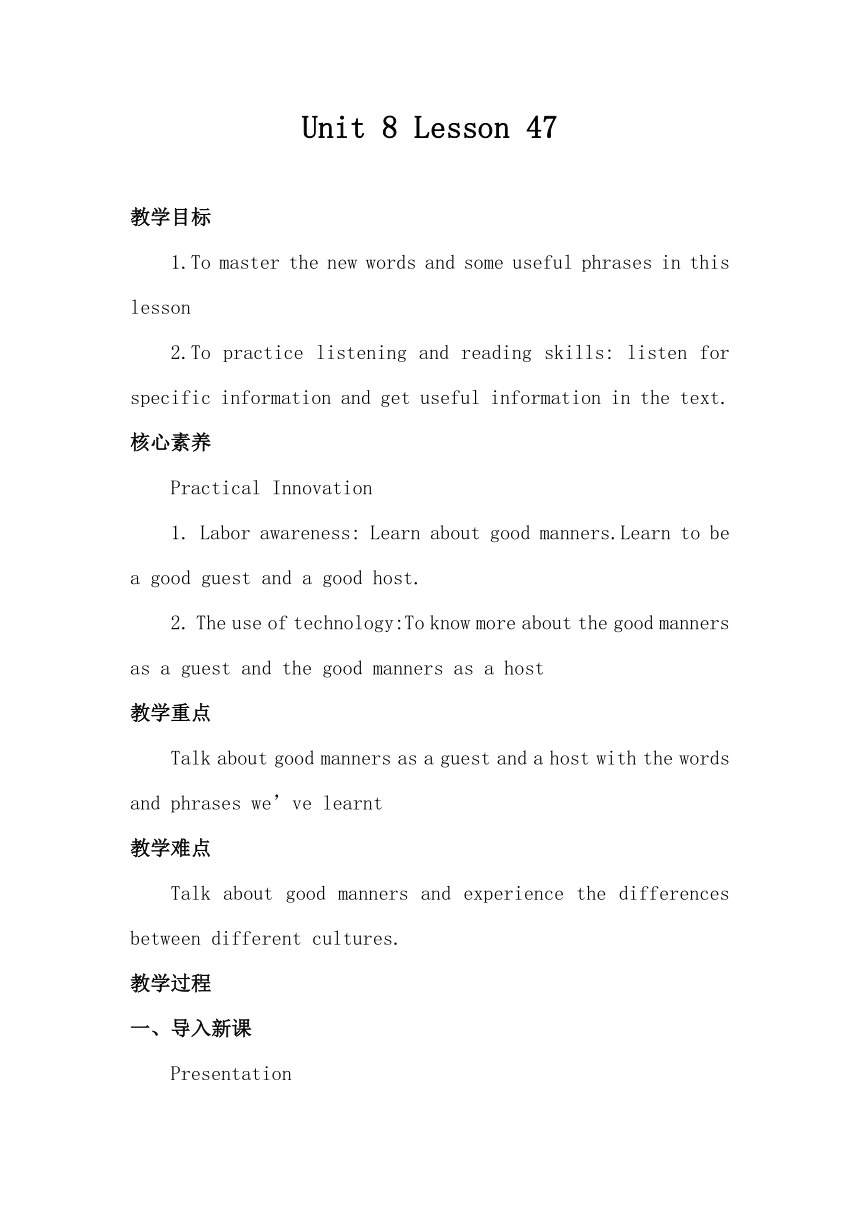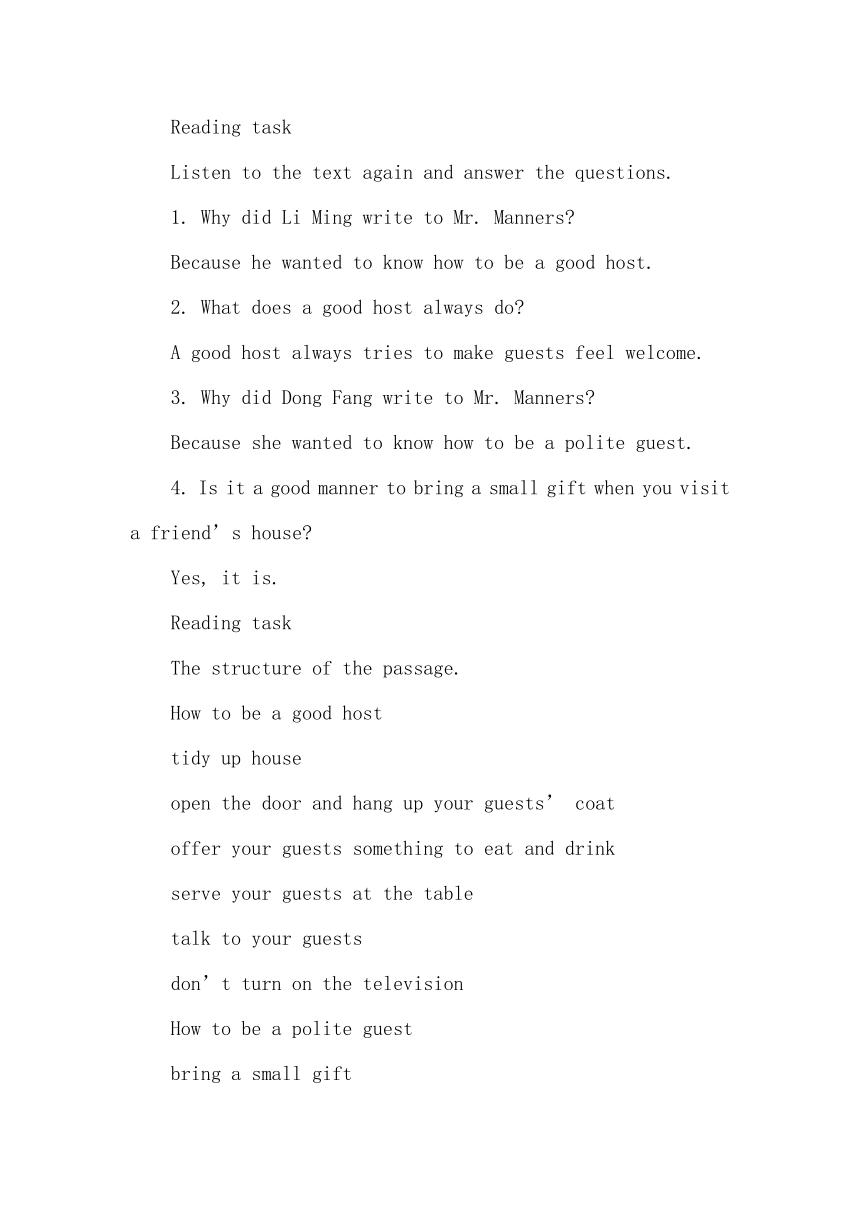冀教版九年级下册Unit 8 Culture Shapes Us Lesson 47 教案
文档属性
| 名称 | 冀教版九年级下册Unit 8 Culture Shapes Us Lesson 47 教案 |

|
|
| 格式 | docx | ||
| 文件大小 | 18.2KB | ||
| 资源类型 | 教案 | ||
| 版本资源 | 冀教版 | ||
| 科目 | 英语 | ||
| 更新时间 | 2024-02-13 00:00:00 | ||
图片预览



文档简介
Unit 8 Lesson 47
教学目标
1.To master the new words and some useful phrases in this lesson
2.To practice listening and reading skills: listen for specific information and get useful information in the text.
核心素养
Practical Innovation
1. Labor awareness: Learn about good manners.Learn to be a good guest and a good host.
2. The use of technology:To know more about the good manners as a guest and the good manners as a host
教学重点
Talk about good manners as a guest and a host with the words and phrases we’ve learnt
教学难点
Talk about good manners and experience the differences between different cultures.
教学过程
一、导入新课
Presentation
Look and say
tidy [ ta di]
Please tidy up the classroom.
Russian [ r n]
Russia [ r ]
Can you make yourself understood in Russian
noisy [ n zi]
noise[n z]
Our next-door neighbours are very noisy.
New words
tidy v. 使整洁;使整齐;整理;整洁的;整齐的
Russian adj./n. 俄罗斯的 俄罗斯人;俄语
noisy adj. 喧闹的;吵闹的
Are they good manners
It is bad manners to ask about women’s age.
It is good manners to offer your seat to the old.
offer sth. to sb.=offer sb. sth.
Hanging up the coat for your guest is good manners.
Don't hang up when someone hasn't finished talking to you
A tidy classroom
Tidy up your classroom before your class begins.
Keeping the classroom tidy is good manners.
Reading task
Listen to the text again and answer the questions.
1. Why did Li Ming write to Mr. Manners
Because he wanted to know how to be a good host.
2. What does a good host always do
A good host always tries to make guests feel welcome.
3. Why did Dong Fang write to Mr. Manners
Because she wanted to know how to be a polite guest.
4. Is it a good manner to bring a small gift when you visit a friend’s house
Yes, it is.
Reading task
The structure of the passage.
How to be a good host
tidy up house
open the door and hang up your guests’ coat
offer your guests something to eat and drink
serve your guests at the table
talk to your guests
don’t turn on the television
How to be a polite guest
bring a small gift
follow the rules of your host’s home
don’t be noisy
offer to help prepare the dinner
write a thank-you note after your visit
Let’s do
Read the lesson and fill in the table.
Mr. Manner's tips for Li Ming
tidy up the house before the guest arrives;
open the door for the guest and hang up his coat;
offer the guest sth. to drink or eat;
serve the guest at the table; make the guest feel at home and talk to the guest;
don't turn on the television
Mr. Manner's tips for Dong Fang
bring a small gift;
follow the rules of the host's home;
don't be noisy;
offer to help prepare the dinner;
write a thank you note after the visit.
Dear Li Ming,
Thank you for your invitation. I had fun at your home. You tidied up your house before I arrived.When I reached your home, you hung up my coat .It made me feel welcome. You offered me something to drink or eat. They were delicious. You didn’t ask me to serve myself and served me at the table warmly. You passed food to me . I have never eaten such wonderful Canadian food before. I really felt at home. Thanks for your kindness. Hope you will come to my house soon.
Your pen pal
三、知识点
Think about it
How do you usually treat a guest in your home
How are you treated when you visit your friend's house
treat 作动词,意为“招待,款待;对待;处理”。
e.g. Don't treat him like this. 不要像这样对待他。
treat 作名词,意为“请客;款待”。
sb.'s treat 某人请客
e.g. This is my treat. 这是我请客。
It’s OK in China, but it’s considered rude in Western cultures.
consider 常用的固定搭配有:
consider doing 意为“考虑做某事”;
e.g. My father is considering changing a job.
我父亲正在考虑换一份工作。
be considered (to be) + adj./n. 意为“被当成是……”;consider...as... 意为“把……当成……”。
e.g. John is considered (to be) my good friend.
= I consider John as my good friend.
我把约翰当成我的好朋友。
It will be my first time visiting a Russian house.
这将是我第一次参观俄罗斯的房子。
visiting a Russian house 是现在分词短语作定语,修饰前面的名词time,过去分词短语作定语时也要放在名词后。
e.g.
I bought a book written by Mo Yan.
我买了一本莫言写的书。
四、作业
1. Make a poster about good manners.
2. Preview Unit 8-Lesson 48.
教学目标
1.To master the new words and some useful phrases in this lesson
2.To practice listening and reading skills: listen for specific information and get useful information in the text.
核心素养
Practical Innovation
1. Labor awareness: Learn about good manners.Learn to be a good guest and a good host.
2. The use of technology:To know more about the good manners as a guest and the good manners as a host
教学重点
Talk about good manners as a guest and a host with the words and phrases we’ve learnt
教学难点
Talk about good manners and experience the differences between different cultures.
教学过程
一、导入新课
Presentation
Look and say
tidy [ ta di]
Please tidy up the classroom.
Russian [ r n]
Russia [ r ]
Can you make yourself understood in Russian
noisy [ n zi]
noise[n z]
Our next-door neighbours are very noisy.
New words
tidy v. 使整洁;使整齐;整理;整洁的;整齐的
Russian adj./n. 俄罗斯的 俄罗斯人;俄语
noisy adj. 喧闹的;吵闹的
Are they good manners
It is bad manners to ask about women’s age.
It is good manners to offer your seat to the old.
offer sth. to sb.=offer sb. sth.
Hanging up the coat for your guest is good manners.
Don't hang up when someone hasn't finished talking to you
A tidy classroom
Tidy up your classroom before your class begins.
Keeping the classroom tidy is good manners.
Reading task
Listen to the text again and answer the questions.
1. Why did Li Ming write to Mr. Manners
Because he wanted to know how to be a good host.
2. What does a good host always do
A good host always tries to make guests feel welcome.
3. Why did Dong Fang write to Mr. Manners
Because she wanted to know how to be a polite guest.
4. Is it a good manner to bring a small gift when you visit a friend’s house
Yes, it is.
Reading task
The structure of the passage.
How to be a good host
tidy up house
open the door and hang up your guests’ coat
offer your guests something to eat and drink
serve your guests at the table
talk to your guests
don’t turn on the television
How to be a polite guest
bring a small gift
follow the rules of your host’s home
don’t be noisy
offer to help prepare the dinner
write a thank-you note after your visit
Let’s do
Read the lesson and fill in the table.
Mr. Manner's tips for Li Ming
tidy up the house before the guest arrives;
open the door for the guest and hang up his coat;
offer the guest sth. to drink or eat;
serve the guest at the table; make the guest feel at home and talk to the guest;
don't turn on the television
Mr. Manner's tips for Dong Fang
bring a small gift;
follow the rules of the host's home;
don't be noisy;
offer to help prepare the dinner;
write a thank you note after the visit.
Dear Li Ming,
Thank you for your invitation. I had fun at your home. You tidied up your house before I arrived.When I reached your home, you hung up my coat .It made me feel welcome. You offered me something to drink or eat. They were delicious. You didn’t ask me to serve myself and served me at the table warmly. You passed food to me . I have never eaten such wonderful Canadian food before. I really felt at home. Thanks for your kindness. Hope you will come to my house soon.
Your pen pal
三、知识点
Think about it
How do you usually treat a guest in your home
How are you treated when you visit your friend's house
treat 作动词,意为“招待,款待;对待;处理”。
e.g. Don't treat him like this. 不要像这样对待他。
treat 作名词,意为“请客;款待”。
sb.'s treat 某人请客
e.g. This is my treat. 这是我请客。
It’s OK in China, but it’s considered rude in Western cultures.
consider 常用的固定搭配有:
consider doing 意为“考虑做某事”;
e.g. My father is considering changing a job.
我父亲正在考虑换一份工作。
be considered (to be) + adj./n. 意为“被当成是……”;consider...as... 意为“把……当成……”。
e.g. John is considered (to be) my good friend.
= I consider John as my good friend.
我把约翰当成我的好朋友。
It will be my first time visiting a Russian house.
这将是我第一次参观俄罗斯的房子。
visiting a Russian house 是现在分词短语作定语,修饰前面的名词time,过去分词短语作定语时也要放在名词后。
e.g.
I bought a book written by Mo Yan.
我买了一本莫言写的书。
四、作业
1. Make a poster about good manners.
2. Preview Unit 8-Lesson 48.
同课章节目录
- Unit 7 Work for Peace
- Lesson 37 Don't Fight!
- Lesson 38 Making School a Better Place
- Lesson 39 The Dove and the Olive Branch
- Lesson 40 The UN—Power of Words
- Lesson 41 Jenny's Good Advice
- Lesson 42 Peace at Last
- Unit Review
- Unit 8 Culture Shapes Us
- Lesson 43 A Visit to Chinatown
- Lesson 44 Popular Sayings
- Lesson 45 Different Manners
- Lesson 46 Home to Many Cultures
- Lesson 47 Good Manners
- Lesson 48 Supper with the Bradshaws
- Unit Review
- Unit 9 Communication
- Lesson 49 Get Along with Others
- Lesson 50 Tips for Good Communication
- Lesson 51 What Could Be Wrong?
- Lesson 52 The Power of a Smile
- Lesson 53 Working in Groups
- Lesson 54 How Embarrassing!
- Unit Review
- Unit 10 Get Ready for the Future
- Lesson 55 Look into the Future
- Lesson 56 Manage Your Time
- Lesson 57 Best Wishes
- Lesson 58 Ms.Liu's Speech
- Lesson 59 Keep Your Choices Open
- Lesson 60 Get a Good Education
- Unit Review
